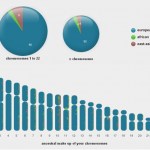risk prediction
As part of his Gene Week celebration over at Forbes, Matthew Herper has a provocative post titled "Why you can't have your $1000 genome". In this post I'll explain why, while Herper's pessimism is absolutely justified for genomes produced in a medical setting, I'm confident that I'll be obtaining my own near-$1000 genome in the not-too-distant future.
Matt's underlying argument is that while sequencing costs will continue to drop, obtaining a complete genome sequence that is sufficiently accurate for medical interpretation will require additional expenses (increased sequence coverage to…
As part of his Gene Week celebration over at Forbes, Matthew Herper has a provocative post titled "Why you can't have your $1000 genome". In this post I'll explain why, while Herper's pessimism is absolutely justified for genomes produced in a medical setting, I'm confident that I'll be obtaining my own near-$1000 genome in the not-too-distant future.
Matt's underlying argument is that while sequencing costs will continue to drop, obtaining a complete genome sequence that is sufficiently accurate for medical interpretation will require additional expenses (increased sequence coverage to…
Late last week I stumbled across a press release with an attention-grabbing headline ("The Causes of Common Diseases are Not Genetic Concludes a New Analysis") linking to a lengthy blog post at the Bioscience Resource Project, a website devoted to food and agriculture. The post, written by two plant geneticists, plays a tune that will be familiar to anyone who has encountered the rhetoric of GeneWatch UK: basically, modern genomics is pure hype perpetuated by scientists seeking grant money and corporations seeking to absolve themselves of responsibility for environmental disasters. …
Late last week I stumbled across a press release with an attention-grabbing headline ("The Causes of Common Diseases are Not Genetic Concludes a New Analysis") linking to a lengthy blog post at the Bioscience Resource Project, a website devoted to food and agriculture. The post, written by two plant geneticists, plays a tune that will be familiar to anyone who has encountered the rhetoric of GeneWatch UK: basically, modern genomics is pure hype perpetuated by scientists seeking grant money and corporations seeking to absolve themselves of responsibility for environmental disasters. …
A reminder to anyone who reads my other blog Genomes Unzipped that we have a reader survey underway there now, which includes some questions about genetic testing experiences and attitudes towards genetics. We're closing the survey to responses this weekend, so if you're an Unzipped reader but haven't had a chance to fill in the survey, please do so now.
Update 30/11/10: 23andMe has extended their 80% discount until Christmas, without a need for a discount code.
Personal genomics company 23andMe has made some fairly major announcements this week: a brand new chip, a new product strategy (including a monthly subscription fee), and yet another discount push. What do these changes mean for existing and new customers?
The new chip
23andMe's new v3 chip is a substantial improvement over the v2 chip that most current customers were run on (the v2 was introduced back in September 2008). Firstly, the v3 chip includes nearly double the…
Back in June I launched a new blog, Genomes Unzipped, together with a group of colleagues and friends with expertise in various areas of genetics. At the time I made a rather cryptic comment about "planning much bigger things for the site over the next few months".
Today I announced what I meant by that: from today, all of the 12 members of Genomes Unzipped - including my wife and I - will be releasing their own results from a variety of genetic tests, online, for anyone to access. Initially those results consist of data from one company (23andMe) for all 12 members; deCODEme for one…
Genetic genealogist Blaine Bettinger has a fantastic post dissecting and contextualising a rather worrying result from his personal genomic analysis: a 50-60% increased lifetime risk of type 2 diabetes.
Blaine is unfortunate enough to be among the 1-2% of individuals who carry two risky versions at each of three major risk variants for the disease. (It's worth noting that type 2 diabetes risk is determined by many different genetic variants, most of which remain unknown, as well as environmental factors - so Blaine's discovery is very far from a certain diagnosis of the disease.)
Blaine's…
Late last week I noted an intriguing offer by personal genomics company deCODEme: customers of rival genome scan provider 23andMe can now upload and analyse their 23andMe data through the deCODEme pipeline.
On the face of it that's a fairly surprising offer. As I noted in my previous post, interpretation is what generates the real value for personal genomics companies, so giving it away for free seems a bizarre approach to business - especially for a company living on the edge of a financial precipice. However, I also argued that the intention here is likely to be to generate an…
Four scientists - including the omnipresent J. Craig Venter (left) - have penned an opinion piece in the latest issue of Nature based results from five individuals genotyped by two separate personal genomics companies. The article highlights some deficiencies in the way that genetic data are currently used by direct-to-consumer companies to generate risk predictions and to present them to customers.
The identity of the tested individuals isn't made explicit in the article, except to note that there were two males and two females from the same family and one unrelated female. All of the…
Mihaescu, R., van Hoek, M., Sijbrands, E., Uitterlinden, A., Witteman, J., Hofman, A., van Duijn, C., & Janssens, A. (2009). Evaluation of risk prediction updates from commercial genome-wide scans Genetics in Medicine, 11 (8), 588-594 DOI: 10.1097/GIM.0b013e3181b13a4f
Caroline Wright from the Public Health Genomics Foundation has a concise post describing the results from a recent paper in Genetic Medicine. The paper evaluates the probability that personal genomics customers will find that their predicted risk of a common disease changes significantly over time as their genetic data…

